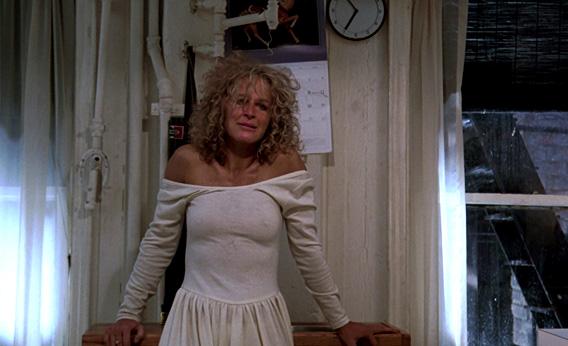
Glenn Close in Adrian Lyne's Fatal Attraction.
Courtesy Paramount Pictures.
Next to the stud horse whose decapitated head winds up in the bed in The Godfather, the most famous mistreated pet in the history of film may be the white rabbit in Fatal Attraction. Those who saw the movie when it was released 25 years ago this week will recall how the crazy bitch stalking the married man kills his kid?s bunny and sets it boiling on the stove. The good wife lifts the lid of the pot to a pretty tasteful reveal?a clipped overhead shot of fur, a discreet dab of blood?and she screams, along with the audience, even though everyone surely knew what was coming.
The ?bunny boiler? remains a potent archetype of a dangerous, predatory woman, her mental state as screwy as the coils of her permed hair. Don?t believe her when she claims she?s just after a night of mutual pleasure. This vagina dentata will ruin your life and is emphatically not worth the five minutes of sizzling sex at the kitchen sink.
Fatal Attraction was nominated for six Oscars (including best picture), earned more than $150 million, and was the subject of intense debate about whether its message was offensively sexist. You?d think that a quarter-century later the movie?s melodrama about the dangers of straying would have badly dated. You?d be wrong. Fatal Attraction still expresses our Puritan queasiness about sexual desire much better than the swarm of stalker rip-offs that it has spawned?as well as our insistence on blaming the skank for any threat to marital fidelity.
Adrian Lyne?s movie may be the mother of all stalker films, but it isn?t the father. Play Misty for Me, Clint Eastwood?s 1971 directorial debut, features a horndog DJ with a cool crib and a vintage Jag convertible and whose one-night stand results in destruction of property and a suicide attempt. Brave Dave is forced to hurl the nutcase over a cliff to her death. But Dave is single. Fatal Attraction?s hero is a married man. And in case you didn?t get the memo: Infidelity is a bad, bad thing.
For this reason, the surprise international blockbuster had to claw its way to screen. Every studio passed. Hollywood decreed that a cheating husband could simply not be sympathetic. So screenwriter James Dearden made straying lawyer Dan Gallagher (Michael Douglas) more of a likeable ?everyman? and Alex Forrest (Glenn Close), his one-weekend stand, spookier, more manipulative. Audiences needed to buy that a guy with a gorgeous wife?but whose cute kid is still crawling into bed with them?is within his testosteronal rights to fall prey to a woman who teases, ?When was the last time you did it in an elevator?? (She knows just how to disable one between floors.)
The movie?s original ending, in which Alex kills herself to the swelling strains of Madame Butterfly, flopped in screen tests. So the coda was rewritten as a rousing revenge match between virtue and vixen. ?I?m Beth Gallagher,? Dan?s wife (Anne Archer, permanently cast thereafter as The Wife) had warned Alex on the phone earlier. ?If you ever come near my family again, I?ll kill you. Do you understand?? And boy, does she?after her hubby?s epic failure to drown Alex in the bathtub, Beth shows up, Dirty Harriet-style, with a gun.
As Susan Faludi wrote about the movie in Backlash: The Undeclared War Against American Women in 1991, Fatal Attraction preached ?the incompatibility of career and personal happiness ? Women?s lives were framed as morality tales in which the ?good mother? wins and the independent woman gets punished.? The movie engendered feminist outrage about the depiction of ?crazy career women,? much to the bewilderment of studio executive Sherry Lansing, who had to keep noting that she was a career woman herself?and had been drawn to the story out of sympathy for the mistreated, lonely Alex.
Source: http://feeds.slate.com/click.phdo?i=aa604ee7cc35dd454ac233994625d000
sinead oconnor braylon edwards jimmer fredette mall of america mennonite smokey robinson smokey robinson
No comments:
Post a Comment
Note: Only a member of this blog may post a comment.